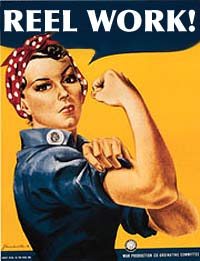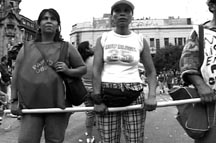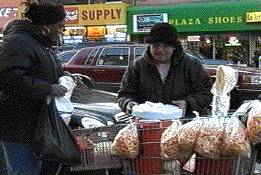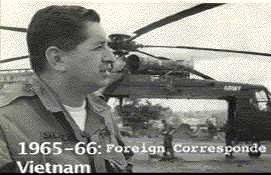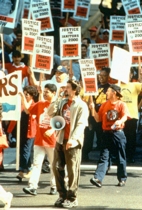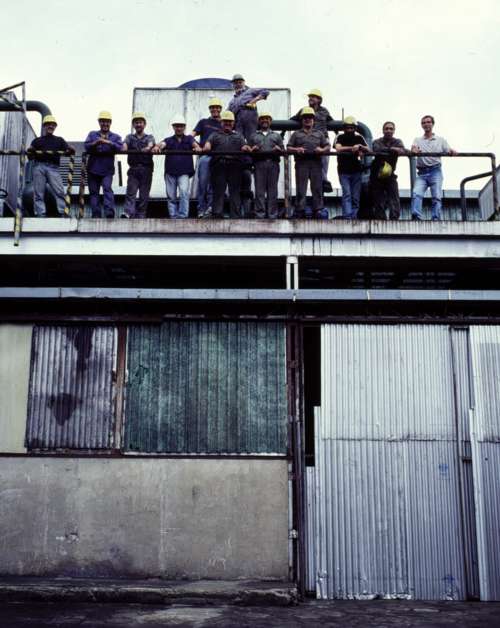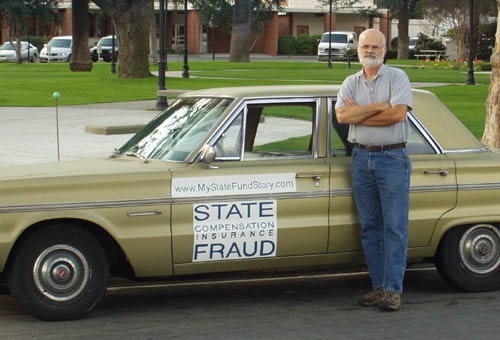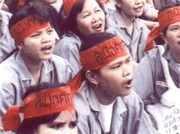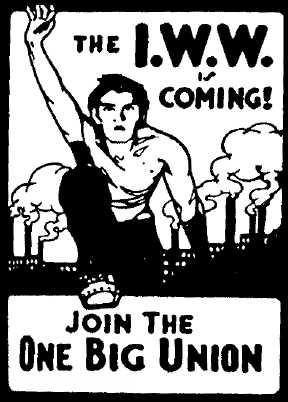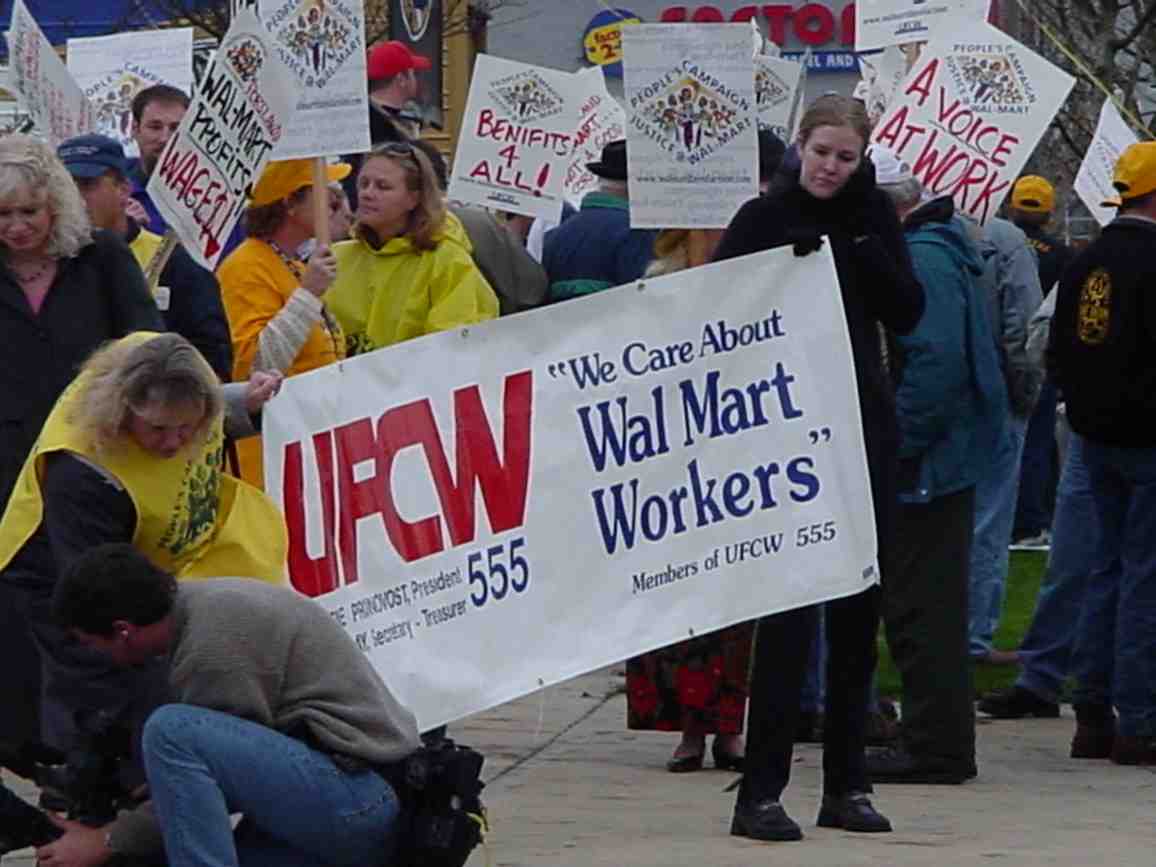Home |
May Day Labor Film Festival |
• FILMS • 2005The
Yes Men A comedic documentary which follows The Yes Men, a small group of prankster activists, as they gain world-wide notoriety for impersonating the World Trade Organization on television and at business conferences around the world. The film begins when two members of The Yes Men, Andy and Mike, set up a website that mimics the World Trade Organization's--and it's mistaken for the real thing. They play along with the ruse and soon find themselves invited to important functions as WTO representatives. Delighted to represent the organization they politically oppose, Andy and Mike don thrift-store suits and set out to shock unwitting audiences with darkly comic satire that highlights the worst aspects of global free trade. Link to website for The Yes Men. Picture
Bride This is a movie about the American dream as seen through the Japanese experience. In the early 1900's, Japanese women came to Hawaii as mail-brides to marry young and wealthy sugar cane farmers. When they arrived, they found that their expectations were not met. They suddenly realized that they were trapped into life as a farm laborer and were married to a husband who was neither young or wealthy and was a farm laborer as well. The movie deals with the trials and tribulations of this life: seeking the means to return to Japan, living in a marriage without love, and coping with the hardships of working as a farm laborer. Link to Internet Movie Database (IMDb) page for Picture Bride. Mardi
Gras: Made In China This documentary is a story of globalization told through humor and sadness, hope and violence. The owner of a bead factory in China, the largest Mardi Gras bead distributor in the world, gives a brutally honest interview. Carnival revelers who exchange beads during Mardi Gras and four teenage sweatshop workers in China who make Mardi Gras beads each get a glimpse of the others' lives. Link to homepage for Mardi Gras: Made in China. Open
The Road to The Women Fighters (Paso a Las Luchadoras) Thousands of women in Argentina have taken up the struggle for liberation by their own hand. Paso a Las Luchadores focuses on seven women whose day-to-day struggles against sexism takes in all aspects of life. These Argentine women see that their oppression is created by the capitalist social system and in Argentina it is manifested by the lack of jobs, the double burden of exploitation that working women face, domestic and institutional violence, and in the lack of freedom to govern one's own body. (Abortion remains illegal in Argentina.) These women look to the creation of an independent assembly of the working class as the way forward for the fight for working woman's power. Link to Ojo Obrero Film Festival page on Paso a Las Luchadores. Stolen
Childhoods Meryl Streep narrates this documentary about the plague of child labor that today is robbing 246 million children of their youth. In extraordinary footage of their working conditions, child slaves, bonded laborers and laboring poor children from eight countries (including the US) tell their own stories. The film reveals the risks of the world community continuing to waste these children's lives, and it portrays local, national and international solutions at work to end child labor. It is a celebration of the resilience of kids whose lives have been saved and a powerful call to action. Link to homepage for Stolen Childhoods. Esperanza
Del Barrio This short video documents the birth of Esperanza del Barrio, a street vendors' association and community organization in East Harlem (El Barrio). Tired of police harassment and determined to defend themselves, a group of Mexican street vendors founds Esperanza, hoping to organize more vendors and improve the conditions they live and work in. In less than 2 years, Esperanza del Barrio has dramatically reduced rates of arrest for East Harlem street vendors, has grown to a membership of 110, has introduced legislation to amend the city's street vendor licensing legislation, and has founded the city's first Mexican youth project. A project designed and directed by Latina/Mexicana street vendors, Esperanza is a successful and thriving community organization that aims to empower Mexican immigrants and their families in El Barrio and throughout New York City. The video tells the story of Esperanza, and its production was part of a collaborative effort between Sabina Gonzalez and the Esperanza Youth Group, who are children of vendors and youth from El Barrio. The project is a work in progress, which the director hopes to expand into a full-length documentary project. Since
Salazar This documentary is a commemoration piece honoring a pioneer within the field of journalism, whose contributions to advocacy through the mainstream media became an invaluable element to the Chicano Brown Power Movement. Ruben Salazar, a bilingual Mexican American journalist, became an influential voice for the Mexican American community when he became a writer for the Los Angeles Times between 1959-1970. In 1969, Salazar landed a position as News Manager at KMEX-TV 34, while continuing to write weekly columns for the LA Times exploring injustices within the Mexican American community. His position as a journalist capable of communicating localized issues to Los Angeles' Spanish-speaking community, made his unbiased news coverage of marginalized communities a strong organizing tool for persons within the Chicano Brown Power Movement. For the first time, they were able to efficiently communicate through the powerful medium of the media. The circumstances around his death on the day of the Chicano Moratorium (the largest gathering of Chicano anti-war protestors in the Nation at the time) led many to believe that his advocacy work through honest and investigative news journalism made institutionalized authority fear his influence on large uprisings within the Chicano community in Los Angeles. This documentary delineates the legacy of Ruben Salazar as an unsung trailblazer for unfiltered news coverage. Rainbow Theater productions are designed to increase awareness of the cultural climate at UCSC and in the City of Santa Cruz. The group's artistic purpose is to create unity, increase visibility and understanding of various ethnic groups, and encourage the celebration of American ethnic diversity and culture. Eyes
On The Fries: Young Workers In The Service Economy Low wages, erratic schedules, no health care, work-school conflicts. This film looks beyond the stereotypes of carefree and undeserving youth to uncover a reality that millions of young working people know all too well: no matter how hard you work and how well you do in school, it can be difficult to stay afloat when you're coming of age in a "McJob" economy. But there are ways to improve things -- and young people are taking the lead. This film was produced by the UC Berkeley Labor Center, a project of the Institute of Industrial Relations at UC Berkeley with the mission to improve the lives of working people by linking the University of California's vast resources with initiatives for social and economic equity. Link to UC Berkeley Labor Center page on Eyes On The Fries. Lewis
County: Hope and Struggle
Bread
& Roses Maverick British filmmaker Ken Loach's first American production, as entertaining as it is thought-provoking, retains his impassioned interest in social justice and ironical wit. Loach personalizes the plight of countless invisible service workers through the struggle of Rosa and her fellow office cleaners to gain dignity and respect on the job. Though the story is fictional, it is based on the real Justice for Janitors campaign by Los Angeles janitors, organized by SEIU, to win recognition and a contract. Link to British Films Catalog web page for Bread & Roses. The
Take In the wake of Argentina's spectacular economic collapse in 2001, Latin America's most prosperous middle class finds itself in a ghost town of abandoned factories and mass unemployment. In suburban Buenos Aires, 30 unemployed auto-parts workers walk into their idle factory, roll out sleeping mats and refuse to leave. All they want is to restart the silent machines. But this simple act -- the take -- has the power to turn the globalization debate on its head. Link to the Grassroots page for The Take. Almost
Broken Synopsis: This is the story of Larry Nign, a worker who was injured and put through the wringer by the State Compensation Insurance Fund, and fought back. While the media blames workers' fraud for high Workers Comp premiums, Nign's experience was that this state owned and operated insurance company, which holds a monopoly on Workers Comp, defrauded injured workers out of life-saving medical benefits and forced families into poverty, while their company crimes of fraud, perjury and obstruction of justice were ignored. Link to homepage for Almost Broken. Fighting
Walmartization
(world premier) A recent proposal to site a Wal-Mart store in Pajaro has local folks pondering the pros and cons. This film documents the Oakland experience: Communities vying for new employment and tax revenues. Locally owned businesses and their personalized service are crushed and Main Street boarded up. Rock bottom prices contingent on sweatshop labor. Good union jobs evaporating under one of the most virulently anti-union corporate credos. Made
In Thailand In Thailand, women make up 90 percent of the labor force responsible for garments and toys for export by multinational corporations. This powerful, revealing documentary about women factory workers and their struggle to organize unions exposes the human cost behind the production of everyday items that reach our shores. Probing the profound impact of the New World Order on the populations that provide the global economy with cheap labor, Made in Thailand also profiles women newly empowered by their campaign for human and worker's rights. Several of these women are survivors of the 1993 Kader Toy Factory fire, one of the worst industrial fires in history. Today they are highly effective leaders in the grass-roots movement mobilizing workers in their recently industrialized country. Link to Women Make Movies catalog page for Made In Thailand. The
Wobblies This historical documentary integrates period songs with photographs, newsreel footage, and contemporary interviews with remaining IWW members. Careful documentation of the cultural, political, labor and legal events since the founding of the IWW in 1905 make this work an invaluable record of an unforgettable era of American history. Link to First Run/Icarus Films web page for The Wobblies. Wal-Mart's
War On The Workers Go behind the closed doors of management's secret meetings and find out the grim reality that Wal-Mart covers up with its smiling face. Intimidation, threats, profiling, surveillance, illegal firings and Orwellian double talk are integral parts of a corporate-wide culture and continuous campaign to crush worker organizing efforts according to Wal-Mart managers and workers interviewed in this film. Link to United Food & commercial Workers Union web page for Wal-Mart's War On The Workers. | 2005 Schedule | 2005 Films | 2005 Speakers | |
